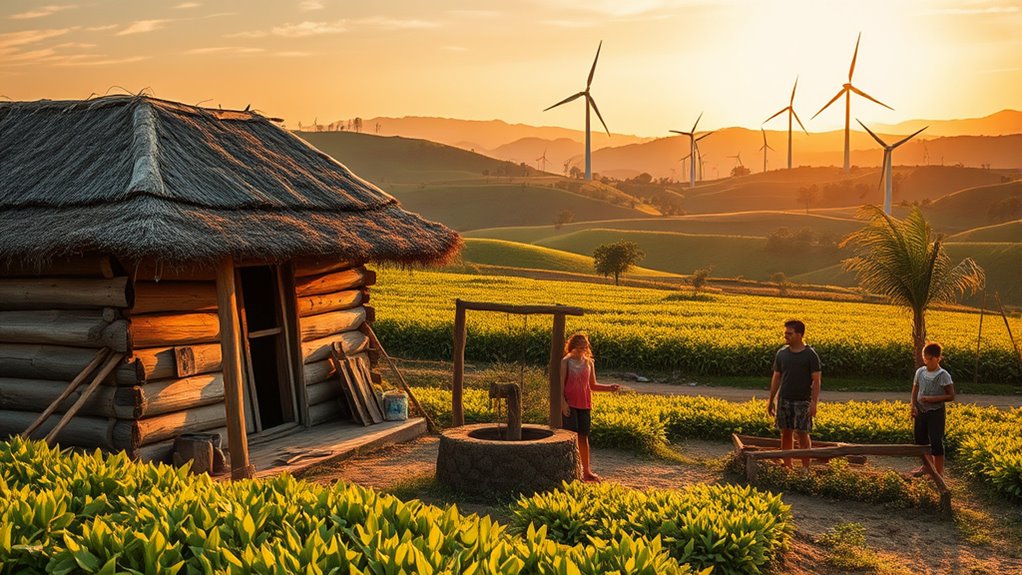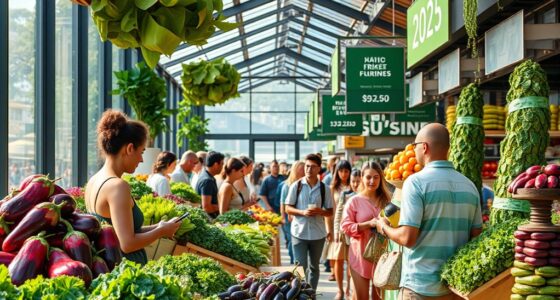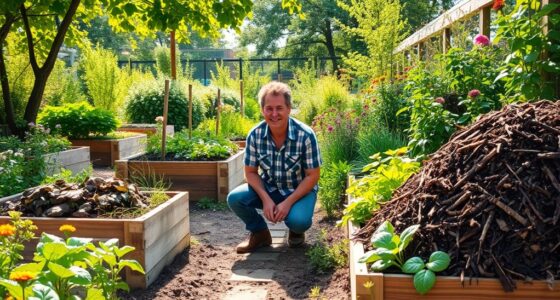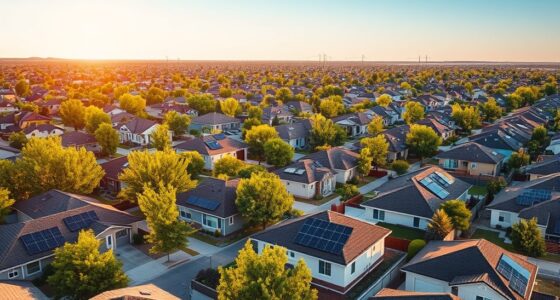In 2025, more people are embracing traditional living practices to reconnect with nature, foster sustainability, and regain control over their food and health. By growing their own food, using natural remedies, and choosing eco-friendly materials, you’re reducing your reliance on industrial systems and minimizing your ecological footprint. This shift helps you live more self-sufficient and resilient. If you want to discover how these timeless methods are shaping lifestyles today, keep exploring this movement.
Key Takeaways
- Growing awareness of environmental impact drives interest in sustainable farming, natural remedies, and reducing reliance on industrial agriculture.
- Desire for self-sufficiency encourages people to cultivate their own food and embrace age-old techniques for health and wellness.
- Mindfulness practices and connection to nature foster healthier lifestyles and deepen appreciation for seasonal cycles.
- Concerns over synthetic pharmaceuticals and chemical inputs motivate a return to herbal remedies and natural skincare.
- Emphasis on eco-friendly materials and harmonious living spaces reflects a shift toward sustainable, traditional lifestyles.

As modern technology continues to advance, many people are turning back to traditional living practices in 2025 to reconnect with simplicity and sustainability. You might find yourself exploring ways to grow your own food through sustainable farming methods that rely on natural fertilizers and crop rotation. Instead of depending solely on store-bought produce, you could cultivate a vegetable garden using age-old techniques that preserve soil health and reduce your carbon footprint. This shift isn’t just about eating healthier; it’s about reclaiming control over what you consume and reducing reliance on industrial agriculture, which often harms the environment.
Alongside sustainable farming, you’re also discovering the value of natural remedies. Instead of reaching for pharmaceuticals, you might prepare herbal infusions or tinctures from plants you grow or forage locally. These remedies can treat common ailments, boost your immune system, and help you develop a deeper understanding of your body’s needs. You may even learn to make salves from beeswax and herbs for skin care or herbal teas that promote relaxation and wellness. Embracing natural remedies connects you to centuries-old traditions that prioritize harmony with nature, offering a gentler, more sustainable approach to health.
Discover the healing power of herbal infusions, tinctures, and salves—timeless remedies for health and harmony with nature.
This return to traditional practices is driven by a desire for authenticity and a concern for the environment. You see the impact of overindustrialization and want to minimize your ecological footprint. By engaging in sustainable farming, you reduce reliance on fossil fuels, packaging waste, and chemical inputs, making your lifestyle more eco-friendly. Similarly, using natural remedies lessens your dependence on synthetic pharmaceuticals, which often involve complex manufacturing processes and generate hazardous waste. These practices foster a sense of self-sufficiency and resilience, helping you build a lifestyle that’s more attuned to natural cycles and local resources.
Furthermore, these methods often bring a sense of mindfulness and connection to the land. When you tend to your garden or harvest herbs, you become more aware of seasonal changes and the importance of working with nature’s rhythms. This awareness deepens your appreciation for the environment and encourages more sustainable habits in other areas of your life. As you incorporate these traditional practices, you may find yourself gaining not only better health but also a greater sense of purpose and community. Sharing tips on natural remedies or exchanging produce with neighbors strengthens local bonds and reinforces the value of collective sustainability.
In addition, incorporating natural materials such as wood, stone, and linen into your living space can enhance your connection to these old-world ways, creating a harmonious environment that reflects your values.
In essence, embracing sustainable farming and natural remedies in 2025 isn’t just about reverting to old ways; it’s about creating a more balanced, intentional lifestyle that prioritizes health, environment, and self-reliance. It’s a conscious choice to live more simply and sustainably in a rapidly changing world.
Frequently Asked Questions
How Do Traditional Practices Impact Modern Environmental Sustainability?
Traditional practices markedly impact modern environmental sustainability by promoting eco-friendly farming methods and renewable energy use. When you embrace indigenous farming techniques, you reduce reliance on chemical fertilizers and pesticides, helping the environment. Similarly, adopting renewable energy sources like solar or wind aligns with sustainable living. These practices lower carbon footprints and conserve resources, making your lifestyle more eco-conscious and resilient for future generations.
Are There Any Health Risks Associated With Returning to Age-Old Living Methods?
Like Pandora’s box, returning to age-old living methods can pose health risks. You might face issues with medication interactions or compromised hygiene standards, which modern medicine and sanitation practices typically prevent. While embracing tradition offers benefits, it’s essential to understand these potential dangers. Staying informed helps you balance the wisdom of the past with current health safeguards, ensuring you enjoy the benefits without unnecessary risks.
How Do Traditional Skills Influence Current Technological Innovations?
You see, traditional skills like ancient craftsmanship and indigenous knowledge profoundly influence current technological innovations. By integrating these time-tested methods, you can develop sustainable solutions and improve modern designs. These skills inspire new approaches to eco-friendly materials and energy efficiency, blending old wisdom with cutting-edge tech. This connection helps you create innovations that respect tradition while advancing progress, ensuring a more sustainable and culturally rich future.
What Role Do Cultural Identities Play in Adopting Traditional Lifestyles?
You might find that cultural identities strongly influence your choice to adopt traditional lifestyles. Many believe that embracing these practices helps with cultural preservation and reinforces your sense of identity. This connection makes traditional ways more meaningful, fostering a deeper understanding of your roots. By choosing to live traditionally, you actively participate in maintaining your heritage, strengthening your community, and ensuring that cultural values stay alive for future generations.
Can Modern Infrastructure Fully Support Traditional Living Practices?
You might wonder if modern infrastructure can fully support traditional living practices. While some aspects, like urban resilience, can integrate traditional methods, others pose challenges. Community resilience thrives when infrastructure respects local customs and needs. You’ll need adaptable systems that balance modern efficiency with traditional practices, ensuring sustainable support for those lifestyles. Overall, thoughtful planning can help bridge the gap, but it requires deliberate effort and sensitivity to cultural values.
Conclusion
As you embrace these timeless practices, you’re planting seeds of resilience in your life’s garden. Just like a sturdy oak weathering storms, returning to tradition roots you deep in community and simplicity. In 2025, these practices aren’t just habits—they’re symbols of renewal, grounding you amid a fast-changing world. By reconnecting with the old ways, you’re nurturing a future where authenticity blooms and strength endures, standing tall like a beacon of hope and stability.









